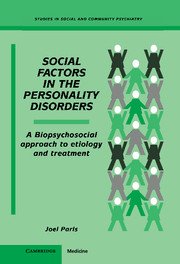Book contents
- Frontmatter
- Contents
- Foreword
- Introduction
- Acknowledgments
- 1 Overview
- 2 Personality Traits and Personality Disorders
- 3 Biological Factors
- 4 Psychological Factors
- 5 Social Factors – Methods
- 6 Social Factors – Mechanisms
- 7 A Biopsychosocial Model of the Personality Disorders
- 8 The Odd Cluster
- 9 The Impulsive Cluster
- 10 The Anxious Cluster
- 11 Treatment
- 12 Clinical Practice
- Epilogue: Summary and Research Implications
- References
- Index
4 - Psychological Factors
Published online by Cambridge University Press: 05 May 2010
- Frontmatter
- Contents
- Foreword
- Introduction
- Acknowledgments
- 1 Overview
- 2 Personality Traits and Personality Disorders
- 3 Biological Factors
- 4 Psychological Factors
- 5 Social Factors – Methods
- 6 Social Factors – Mechanisms
- 7 A Biopsychosocial Model of the Personality Disorders
- 8 The Odd Cluster
- 9 The Impulsive Cluster
- 10 The Anxious Cluster
- 11 Treatment
- 12 Clinical Practice
- Epilogue: Summary and Research Implications
- References
- Index
Summary
To what extent is personality shaped by childhood experiences?
Personality disorders begin early in life, and remit only slowly with time. These characteristics are, of course, intrinsic to their definition. Yet they still demand an explanation. Early onset and chronicity could be accounted for by two alternative theories: (1) the origins of personality disorders lie in temperament; (2) the crucial psychological risk factors for these disorders derive from childhood experiences.
The hypothesis that early experiences, particularly problems in parent-child relationships, can either shape or deform personality, has been taken for granted by generations of theorists. Psychoanalytic theory has explained the consistency of personality over time by assuming a primacy for early experience. The principle is that early learning should have a greater impact than later learning, since it occurs at a time when the child is more dependent on its parents (Millon, 1969). Psychodynamic models all assume that the more severe the pathology, the earlier in life is its origin (Paris, 1983).
In spite of their ubiquity, these assumptions have not been supported by empirical research. One of the most important findings of research in developmental psychopathology is that, by and large, single negative events do not usually cause psychiatric disorders (Rutter & Rutter, 1993). Given a reasonably favorable environment, most children are resilient. In vulnerable children, who lack resilience, stressors have a greater impact. The pathogenic effects of negative events therefore involve interactions with preexisting diatheses.
- Type
- Chapter
- Information
- Social Factors in the Personality DisordersA Biopsychosocial Approach to Etiology and Treatment, pp. 40 - 63Publisher: Cambridge University PressPrint publication year: 1996



